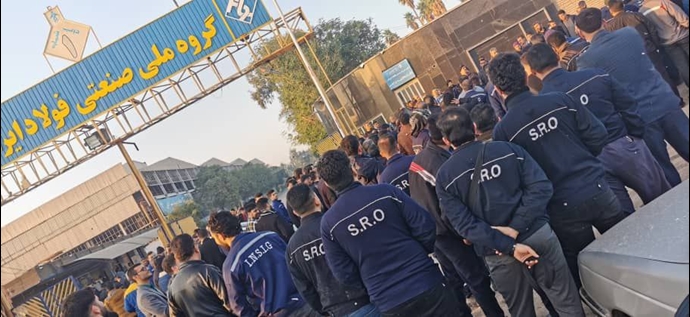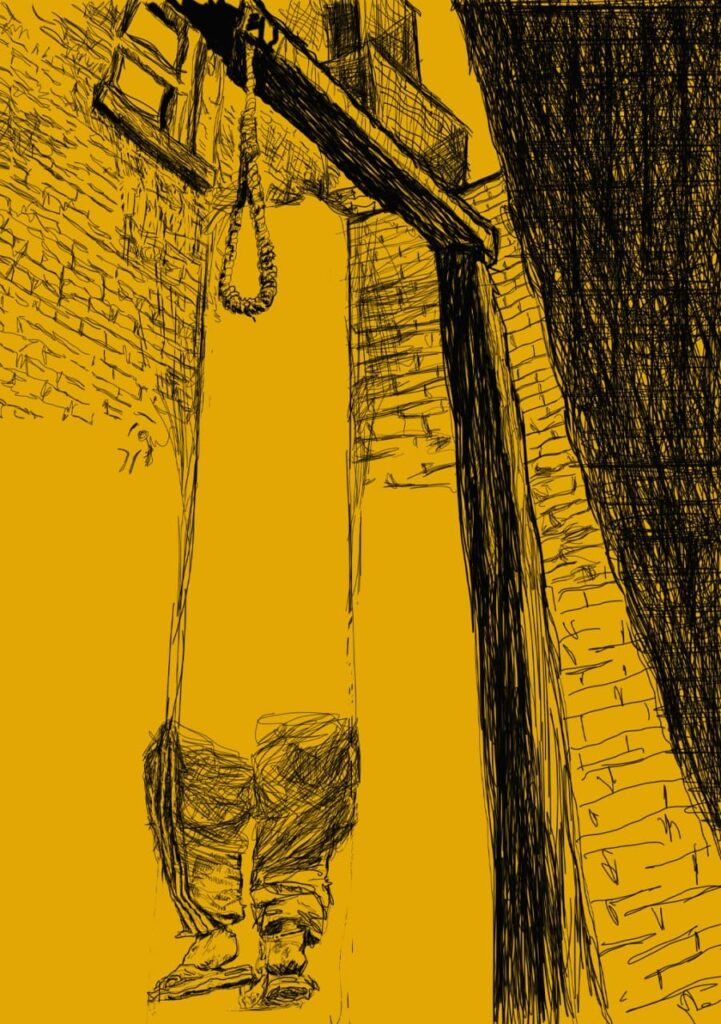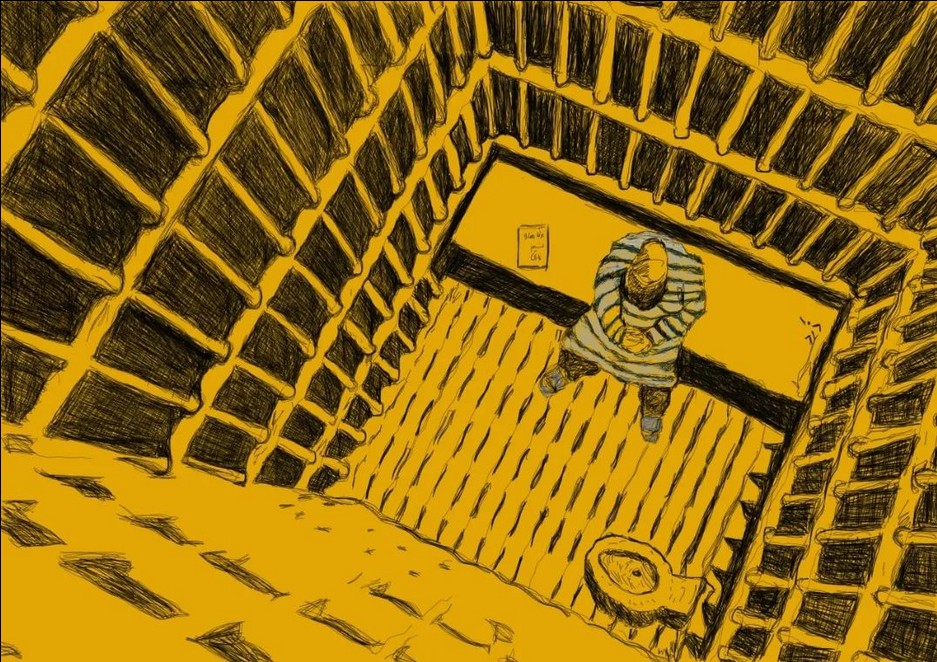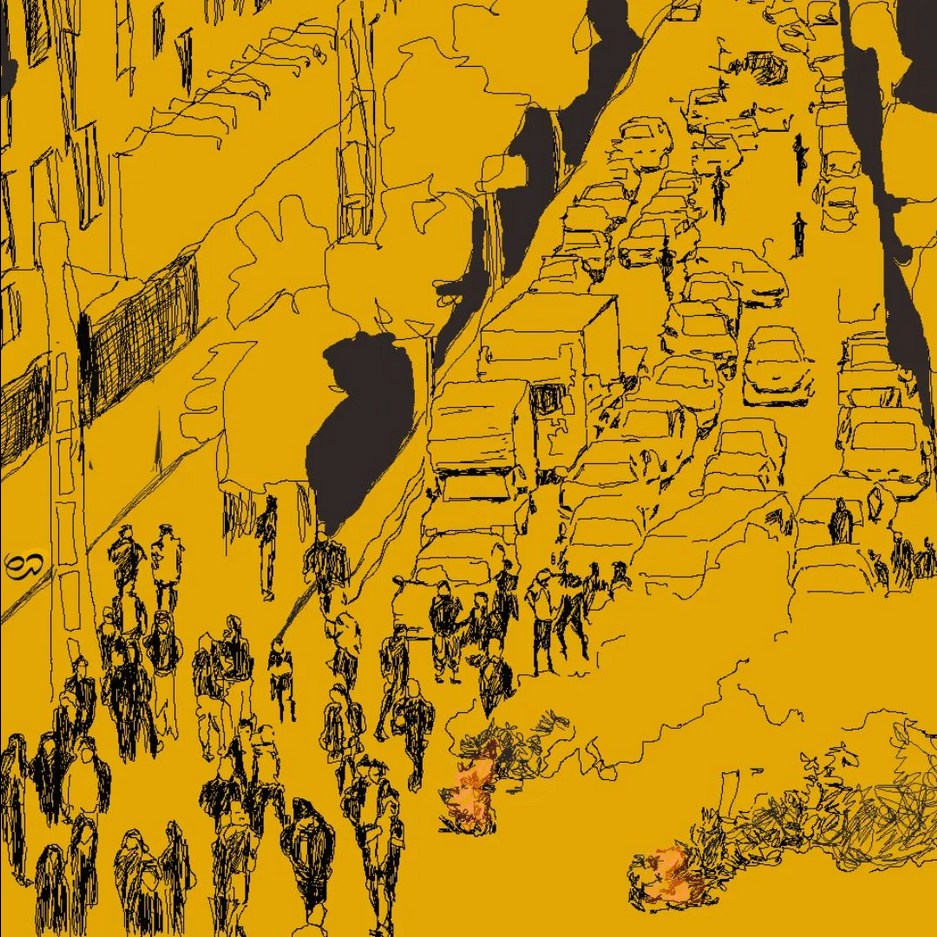The Iran Labour Confederation – Abroad has sent an urgent letter to labor unions worldwide, drawing attention to the situation of workers at the National Iranian Steel Industrial Group in Ahvaz. These workers began their protests on November 9, 2023, when they demanded the implementation of a job classification plan, which the company’s management had failed to execute for over two decades, despite it being mandated by Iran’s Labor Law.
The initially peaceful protests escalated following the suspension of 38 workers by the company’s management, acting on orders from the Provincial Security Council of Khuzestan. This clearly demonstrated the involvement of Iran’s intelligence and security agencies in labor disputes. A temporary agreement was reached on December 30, 2023, which promised partial implementation of the job classification plan. However, later that month, management reneged on this agreement, leading to the resumption of protests.
Although the classification plan was eventually implemented with many flaws, some workers who participated in the protests, were dismissed. Seven of these workers remain barred from returning to work, with the Provincial Security Council preventing their reinstatement. These dismissals, affecting many workers who were nearing retirement, have worsened the situation.
The Confederation calls on international labor unions to condemn these repressive actions and file complaints against the Islamic Republic of Iran with the International Labour Organization (ILO) for its systematic violations of workers’ rights.
The text of the letter is as follows:
Report on Iranian Steel Industrial Group
To: Labour Unions Worldwide
Workers of the National Iranian Steel Industrial Group (INSIG) in Ahvaz began protests on November 9, 2023, demanding the implementation of a job classification plan. For over two decades, the company’s managers and shareholders have refused to execute this plan, which is mandated by Articles 48 and 49 of Iran’s Labor Law.
Initially, the protests consisted of brief gatherings held for a few hours within the workplace. On December 23, 2023, the company’s security management, operating under the Ministry of Intelligence, issued a directive banning 21 workers from entering the premises. The following day, on December 24, an additional 17 workers were barred from returning to work, fueling further anger among the workers and leading to a full strike across all factories.
The former CEO of the National Steel Group stated in an interview with ILNA, a state-affiliated news agency, on December 23 that the decision to ban the protesting workers from entering the company was not made by them, but by the Provincial Security Council of Khuzestan. This indicates that the workers were not dismissed according to the disciplinary procedures outlined in the Labor Law, but rather by direct orders from intelligence and security agencies.
It is important to note that in every province of Iran, a council exists consisting of the provincial governor, the commander of the Islamic Revolutionary Guard Corps (IRGC), the head of provincial security and intelligence, the police chief, the prosecutor general, and the prosecutor of the Revolutionary Court. This council is responsible for making decisions regarding the security, political, and social affairs of each province. In this particular case, as well as in similar incidents, such as the dismissed workers from the Esfahan Steel Company and workers laid off from oil projects, it was this security body that made the decisions.
On December 30, 2023, during a meeting attended by the company’s CEO, a representative from Bank Melli Iran as the owner of the National Steel Group, a representative from the Ministry of Labor, the Deputy Governor of Khuzestan, a representative from the Ministry of Intelligence, and representatives of the protesting workers, it was decided that in exchange for ending the strike, 50% of the benefits from the job classification plan would be temporarily paid to the workers monthly until the full review and preparation of the classification tables. Additionally, the 38 suspended workers would be reinstated.
However, on January 27, 2024, the factory’s board of directors announced that they were unwilling to implement the job classification plan as previously agreed and could only pay 5% to 7% instead of the promised 50%. As a result of this decision, the workers of the National Steel Group went on strike again.
Ultimately, in mid-February, the job classification plan was implemented, though with many flaws. Gradually, dismissal orders for some of the protesting workers were issued, and by March 19, the number of dismissed workers had increased.
After seven months, 12 workers returned to their jobs last week. However, four contract workers and three subcontracted workers, who played a key role in the protests and the demand for the job classification plan, remain dismissed. The current CEO has stated that the Provincial Security Council is preventing the return of these workers, making it impossible for the company to reinstate them.
Despite the dismissed workers filing complaints with the Labor Department, their demands for reinstatement remain unaddressed. These workers, with between 17 and 20 years of service, were on the verge of retirement, but their dismissal has severely impacted their ability to retire.
The names of the dismissed contract workers:
Hosein Rezaee, Saeed Halvaei, Morteza Akbarian, Masoud Navaser
The names of the dismissed subcontracted workers:
Abdollah Chahardah Cherik, Ali Sayahi, Ghasem Tavangar
The situation for workers at the Esfahan Steel Company is even worse. Workers went on strike on December 2, 3, and 4, 2023, with more than 3,000 workers gathering during each shift at the factory. However, in an illegal move, riot police forces entered the factory, suppressed the workers, and arrested more than 40 of them. Following this, the CEO and the company’s security department barred over 200 workers from entering the premises. The deployment of special forces into the factory grounds is entirely illegal and had also occurred during the workers’ strike in November 2022. The Esfahan Steel workers are merely demanding the implementation and reform of the job classification plan, which is required under Iranian labor law, but for years, the management has refused to comply.
Such repressive actions have also been rampant in relation to workers in the oil, gas, and petrochemical sectors.
The involvement of the government’s security agencies in the suppression, arrest, and even dismissal of workers in Iran has become a regular practice. Security forces issue the orders to dismiss any worker involved in organizing protests to pursue their rights.
We urge our colleagues in labor unions to file complaints against the Islamic Republic of Iran for its suppression and severe violations of workers’ rights with the International Labour Organization. We also ask them to send letters to officials in the Islamic Republic, condemning the repression of workers and the dismissal of our colleagues.
Iran Labour Confederation – Abroad
September 30, 2024




